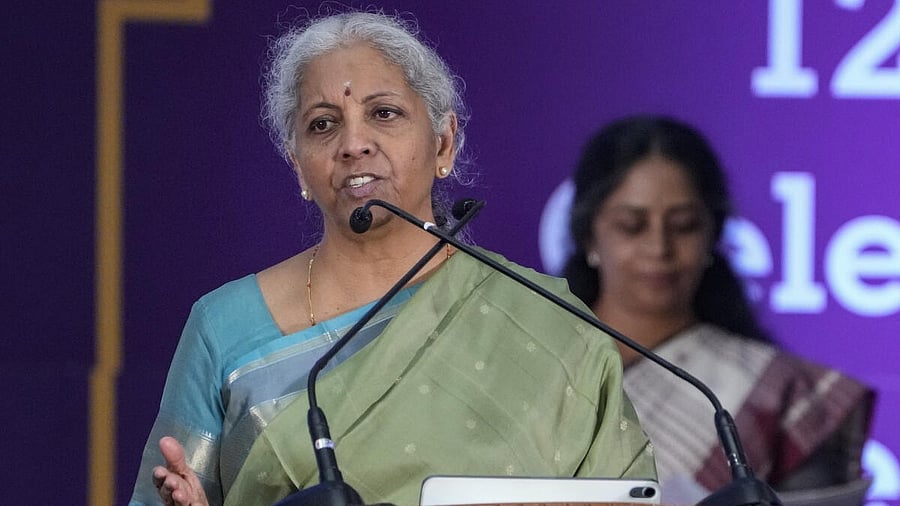
Finance Minister Nirmala Sitharaman addresses the gathering during the 120th foundation day celebrations of City Union Bank, in Chennai.
Credit: PTI Photo
Chennai: The next-generation GST reforms would 'absolutely' set an economy open and transparent with further reduction in compliance burden and benefiting small businesses, Union Finance Minister Nirmala Sitharaman said on Tuesday.
She was speaking at the 120th Foundation Day celebrations of Tamil Nadu-based City Union Bank, where President Droupadi Murmu was the chief guest. Sitharaman said Prime Minister Narendra Modi recently announced the creation of a Task Force for next generation reforms with a clearer mandate to simplify regulations, lower compliance costs and also build a more enabling ecosystems for startups, Micro, Small and Medium enterprises and entrepreneurs.
"Complementing this, the planned roll out of the next generation GST reforms with the planned Council meeting tomorrow and day after, will set an economy absolutely open and transparent in the coming months and with further reduction in compliance burden, making it easier for small businesses to thrive" Sitharaman said.
In his Independence Day address, PM Modi announced big-ticket Goods and Services Tax (GST) reforms and promised a Diwali bonanza for citizens. Sitharaman further said that if India is advancing towards its vision of Viksit Bharat 2047 then the banks are called upon to not only expand credit but also provide momentum for infrastructure development, ensure timely and need-based funding for MSMEs, bringing the unbanked into the fold of formal banking and meeting diverse requirements where the support of banking channels was vital.
"The guiding principles for this transformation must be trust, technology and transparency." she noted. Over past 11 years, 56 crore Jan Dhan accounts have been opened with total deposits of Rs 2.68 lakh crore, and majority of the account holders were women, she said. Sitharaman also pointed out that Indian scheduled commercial banks have recorded massive improvement in asset quality. Credit rating agency S&P has upgraded the country's long term sovereign credit rating for the first time in 18 years, she added.
She said that the Gross NPAs (Non-Performing Assets) of the Scheduled Commercial Banks have come down to 2.3 per cent as of March 31, 2025 while net NPAs were at 0.5 per cent.
"I would think, at a time which is so challenging as this, our banks to achieve this is phenomenon and all Indian banking sector members, families, employees, the Board will have to get our due recognition for the wonderful service they have done," she said.
As a result of the record massive improvement on the asset quality of Scheduled Commercial Banks, she said the aggregate capital levels of banks would continue to remain above the regulatory minimum even under these 'adverse stress scenarios.'
"So, strong and well capitalised banks with a near record low NPAs mean cheaper, steadier credit for households, MSMEs and infrastructure, lower systemic risks and also sustained confidence in India's financial system," Sitharaman noted.
Touching upon some of the fundamentals of the financial sector, she said that the April-June 2025 quarter registered a Gross Domestic Product (GDP) growth of 7.8 per cent beating all estimates and showing overall good momentum across various sectors.
Inflation rates have registered for nine consecutive months 'a decline' and reached an eight year low of 1.55 per cent in July 2025, she said.
As of June 2025, Sitharaman said the Employee Provident Fund Organisation (EPFO) saw a net addition of nearly 22 lakh members which marks the second consecutive month of record additions.
Quoting a study undertaken by Indian Institute of Management, Bengaluru she said, the Pradhan Mantri Jan-Dhan Yojana accounts helped safeguard the financial savings and were of great help particularly during COVID time.
"Bank account is not just a passbook. It is a passport to opportunities enabling access to credit, savings, insurance and dignity," she said.
The sustained focus on MSME lending, retail and wholesale trade and agriculture by the City Union Bank has empowered entrepreneurs, small businesses and farmers truly living up to the principle of "finance must support growth at the grass root level."
Observing that the guiding principles for banks to advance India towards Viksit Bharat 2047 is based on Trust, Technology and Transparency, Sitharaman said, "trust is earned through consistent service of ethical conduct and sound governance. It is very important for the banks to earn and retain trust."
Technology should be leveraged not only for efficiency of banks but also for inclusion and customer empowerment. Transparency should ensure that every Rupee carries not just an interest to banks but also intended to align with Nation building, she said.